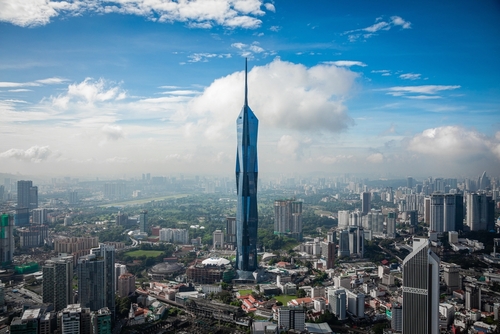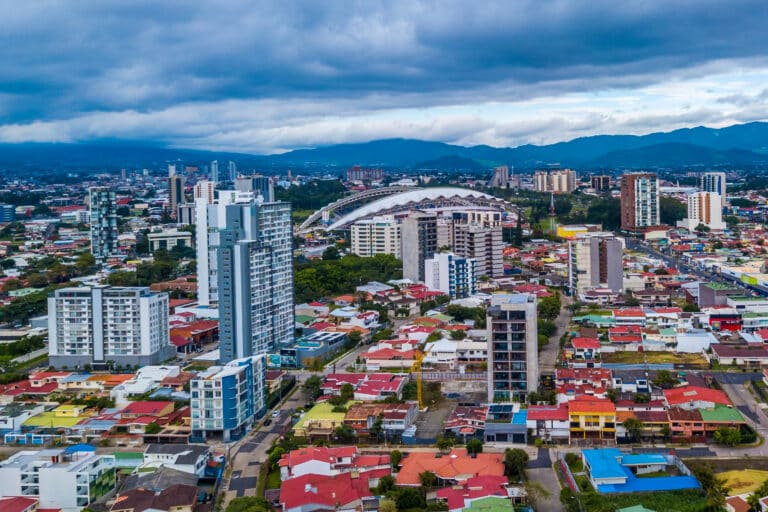More and more Americans are packing up and starting fresh somewhere new. Maybe you’re dreaming of sunnier skies and lower living costs. Perhaps you want to work remotely on the beach, or just find a slower, more balanced way of life. Whatever your reasons, moving abroad can offer the reset you didn’t know you needed.
How did we calculate the best countries for high quality of life and low cost of living? We used a global Quality of Life Index as well as a the world’s largest Cost of Living Index and compared the two, weighting quality of life slightly higher (60%) than cost of living (40%). This gave us a global ranking to dig into to show where people should consider when looking for the best of both worlds.
What does “affordable and livable” really mean?
If you’ve ever daydreamed about moving abroad, you’ve probably wondered: Where could I live well without spending a fortune?
Countries with a low cost of living typically allow individuals or families to maintain a comfortable lifestyle without spending a large portion of their income. Rent is reasonable, groceries and eating out are affordable, and getting around doesn’t require a car payment the size of a mortgage.
On the other hand, a high quality of life is a little broader and subjective. It combines factors that contribute to overall well-being—things like health, education, personal safety, environmental quality, social connection, and work-life balance. Put simply, it means living in a place where you feel safe, supported, and able to enjoy life, not just survive it.
Key criteria for consideration
To make it onto this list, each country has to check a few important boxes.
- Housing and utilities: Is it affordable to rent or purchase a home in this country/city? How do bills impact this cost?
- Goods and entertainment: How much does it cost to buy clothing and food? Is eating out and enjoying leisure activities going to break the bank?
- Transportation: Can you get around easily, quickly, and affordably?
- Healthcare: Is there access to quality medical care, either publicly or privately?
- Climate: Are the seasons comfortable and suitable for your lifestyle?
- Safety: Is the area known for low crime rates and a general sense of security?
- Lifestyle: What’s daily life like? Is there good food, culture, green space, or community?

Countries with low cost of living and high quality of life
We know that affordability looks different for everyone. But if you want to make your budget go further without giving up the things that matter most, these countries are a great place to start.
1. Japan: Order, efficiency, and hidden affordability
- Average one-bedroom rent: $500-$600 (outside Tokyo)
- Average annual salary: $32,502
Japan might not seem like a budget destination, but outside of Tokyo, many regions offer surprising affordability paired with top-tier services.
Rents in cities like Fukuoka or Sapporo could be around $500 to $600 USD per month, but this can be as low as $375 outside of some cities. Food, transportation, and day-to-day expenses are lower than many expect once you step outside the big urban centers.
Japan’s healthcare system is advanced and accessible, and public services are highly reliable. Japanese culture emphasizes cleanliness, respect, and community, which creates a highly liveable environment. The country is also known to appeal to remote workers and cultural enthusiasts, especially if you appreciate structure and tradition in your day-to-day life.
2. Spain: Culture, comfort, and community
- Average one-bedroom rent: $813/month (outside of city centers)
- Average annual salary: $38,155
Spain offers that enviable mix of cultural richness, Mediterranean lifestyle, and affordability. With an economical cost of living and excellent public services, it’s a top pick for Americans looking for a smoother transition.
In Valencia. Seville, and other expat-friendly cities, the monthly rent outside the urban centre is above $810 USD. General living expenses remain reasonable, too. Spain’s healthcare system is also one of the best in Europe, providing both public and private options.
Beyond that, daily life is full of cultural events, excellent food, and welcoming communities. The lifestyle is built around harmony, and many people find it easy to settle in quickly. Spain is especially appealing to families and retirees looking for quality without the high cost.
3. Croatia: Beauty on a budget
Croatia’s Adriatic coastline and historic cities continue to attract people looking to live somewhere surrounded by scenic beauty. With an affordable cost of living, it’s a great choice.
Rentals in historic cities like Split or Zadar average around $700 USD per month, and food and transportation are similarly budget-friendly.
Croatia’s lifestyle is relaxed and beach-oriented, with a strong sense of community. It’s especially popular with retirees and freelancers who want a picturesque and peaceful setting.
4. Lithuania: Quiet charm and modern connectivity
- Average one-bedroom rent: $490 (outside of city centers)
- Average annual salary: $33,206
Lithuania combines Northern European quality with Eastern European affordability, making it a hidden gem for those seeking a calm but connected lifestyle. In cities like Vilnius and Kaunas, rents remain reasonable, and public transport, groceries, and healthcare are among the most affordable in the EU. Despite its modest size, Lithuania offers strong digital infrastructure, reliable internet, and an emerging tech scene that attracts remote workers and entrepreneurs alike.
With cozy cafés, art events, and growing international communities, Lithuania is ideal for anyone seeking European comfort and stability without the premium price tag.
5. Portugal: Sunshine, savings, and a slower pace
- Average one-bedroom rent: $829 (outside of city centers)
- Average annual salary: $26,762
Portugal is one of Europe’s most attractive destinations if you’re looking for affordability and quality. With a lower cost of living and a warm Mediterranean climate, Portugal ranks highly for families, older travelers, and remote workers.
The lifestyle here is relaxed and community-focused, with friendly locals, fresh food markets, and beautiful coastlines. Whether you’re walking through Lisbon’s tiled streets or enjoying the calm of the Algarve, Portugal offers a quality of life that feels much richer than its price tag. It’s especially popular with retirees and digital nomads who are drawn to its laid-back pace and ease of integration.
6. Czech Republic: Historic cities, modern living
- Average one-bedroom rent: $673 (outside of city centers)
- Average annual salary: $27,082
Scoring lower than most on cost of living indeces the Czech Republic gives you an opportunity to combine affordable living with modern accessibility wrapped in a bow of culture. In Prague, rent for a one-bedroom apartment averages around $1,230 USD, while smaller towns can offer much lower prices.
Healthcare in Czechia is high-quality and affordable, and the country is well-connected by an efficient public transportation system. With historic charm, walkable cities, and a growing expat community, it’s a favorite for foreigners looking for value and cultural enrichment.
7. Slovenia: Nature, safety, and small-city charm
- Average one-bedroom rent: $650 (outside of city centers)
- Average annual salary: $42,862
Tucked between Italy and Croatia, Slovenia really delivers on natural beauty and peace of mind. With a low cost of living index, it’s affordable without compromise. Rent in the capital, Ljubljana, can be much higher, around $1,020USD per month, and utilities and transportation costs are fairly economical.
It’s a safe, clean, and organized country with excellent outdoor activities year-round. For families and nature-loving expats, Slovenia offers a slower pace of life mixed with access to world-class hiking, skiing, and lakeside towns.
8. Poland: History and progress
- Average one-bedroom rent: $637
- Average annual salary: $24,979
Culture. Modern development. Affordability. With its rich history, vibrant cities, and booming economy, it has become one of Europe’s most appealing destinations for expats and remote professionals. Cities like Kraków, Warsaw, and Gdańsk offer well-preserved architecture, dynamic job markets, and a growing international community all with a price tag much lower than other EU countries.
A one-bedroom apartment outside major centers averages around $630 USD per month, and public transport, groceries, and dining remain accessible. Poland also benefits from a robust healthcare system and reliable infrastructure, ensuring comfort without excessive costs.
9. Bulgaria: Big landscapes and big savings
- Average one-bedroom rent: $360
- Average annual salary: $16,632
Bulgaria stands out as one of Europe’s most affordable destinations, offering excellent value for those seeking a slower pace of life surrounded by nature. Whether you settle in Sofia, Plovdiv, or along the Black Sea coast, everyday costs remain low. A one-bedroom apartment outside city centers averages just $360 USD per month, leaving plenty of room in the budget for travel and leisure, especially if working for companies outside of Bulgaria.
While you know your dollars can go far here, Bulgaria also delivers a high quality of life through its mix of history, culture, and stunning natural scenery. Residents enjoy easy access to mountains, beaches, and thermal springs, while the country’s growing digital infrastructure is attracting remote workers and entrepreneurs.
10. Latvia: Baltic balance of nature and growing infrastructure
- Average one-bedroom rent: $340
- Average annual salary: $28,665
Exceptional public services and high safety levels make Latvia a comfortable choice for many. Especially those who want to dive into the vast nature and UNESCO cultural sites. Its capital, Riga, blends Art Nouveau architecture with a growing creative and tech scene, while smaller towns and coastal areas provide a peaceful, budget-friendly lifestyle. Rent for a one-bedroom apartment outside city centers averages around $340 USD per month, and essential costs like transport, dining, and utilities remain comfortably low by European standards. English is widely spoken, and the digital infrastructure is strong, a bonus for remote workers and entrepreneurs. Latvia’s blend of scenic calm, cultural charm, and economic practicality makes it one of Europe’s best-kept secrets for quality living at a fair price.

Honorable mentions for good cost of living and quality of life
There were so many more countries we could have included, but these three in particular stood out as key countries we had previously ranked in this analysis and are worth considering for those looking for their next move abroad.
Malaysia: Big value in Southeast Asia
- Average one-bedroom rent: $265 (outside of city centers)
- Average annual salary: $8,679
Malaysia offers incredible value, especially in areas like Penang or Kuala Lumpur. Quality one-bedroom apartments in city centers can be found for $400–500 USD per month, and groceries, transportation, and eating out costs are all significantly cheaper than in most Western countries.
The country has well-equipped hospitals and clinics, with many medical professionals trained abroad. English is widely spoken in urban areas, making it easier to navigate daily life. That’s why Malaysia is a popular choice for remote workers and long-term expats who appreciate a good work-life balance.
Cyprus: Affordable island life with a European twist
- Average one-bedroom rent: $861
- Average annual salary: $34,354
This island nation in the Mediterranean often flies under the radar but has plenty to offer. With affordable living and stunning coastlines, Cyprus is a hidden gem.
Apartments can run between $600 USD and $800 USD per month, particularly in areas away from the main tourist hubs. The cost of daily life is similarly budget-friendly, especially for groceries and local transport.
The Cypriot lifestyle is laid-back, with mild winters, sunny beaches, and a blend of Greek and Turkish cultural influences. Cyprus is ideal if you want an island lifestyle without extreme remoteness or the high price tag.
Estonia: A smart and sustainable choice
- Average one-bedroom rent: $504
- Average annual salary: $29,974
Estonia is known for its digital-forward culture, safety, and clean environment, it’s a fantastic option if you want affordability plus innovation, particularly for any budding entrepreneurs.
In cities like Tartu, Pärnu, or the capital Tallinn, a one-bedroom apartment can set you back at least $700 USD per month.
Estonians enjoy a quiet but high-tech lifestyle, complemented by lots of natural scenery and a focus on sustainability. It’s especially appealing if you’re a digital nomad or young professional looking for a new place to call home in Europe.
Relocation tips to make the move
Once you’ve decided on a place that feels like it could be “the one,” the next step is planning how to get there and what life might look like once you arrive.
Visa and residency requirements
Every country has its own rules when it comes to visas, so this is one of the first things you’ll want to check. Some places offer digital nomad visas or retirement-friendly options, while others might ask for proof of income, a job offer, or family ties.
It’s a good idea to visit your destination’s official immigration website. They usually have step-by-step guides for getting started. And don’t forget that processing times can vary, so the earlier you begin this part, the better.
Build a realistic budget
As you’ll quickly realize, relocation means flights, visa fees, housing deposits, travel costs, and all those little things you don’t think about beforehand, like buying a SIM card or going on your first grocery run.
Start by writing out your expected expenses, then add a bit of wiggle room for unexpected costs. Exchange rates can change quickly, too, so it’s helpful to budget in both your home and destination currencies.
Having a clear picture of your finances makes the entire process feel more manageable.
Visit before you decide
Spending a few weeks or even months in your potential new home can make a huge difference. It’s one thing to fall in love with a place on vacation, and quite another to experience your daily routine there. Where will you get your morning coffee? Can you get around easily? Does the pace of life feel right for you? All these details could play into your final choice
Challenges to expect, and how to solve them
Moving to a new country comes with a learning curve. The good news is that most challenges are temporary, and many become rewarding parts of the experience once you settle in.
Getting comfortable with the language
Not everyone speaks English, especially outside big cities; that can be intimidating at first. But learning even a few everyday phrases can go a long way in helping you feel more at home.
Whether it’s ordering food or asking for directions, the effort is always appreciated. Local language classes and apps like Duolingo can make it feel less like a chore and more like a fun part of the journey.
Plus, stumbling through a new language often leads to the most memorable—and humbling— moments, bonding with locals included.
Figuring out how things work
Every country runs a little differently, and systems like banking, public transport, or healthcare might take a little adjusting to. That first visit to a local clinic or figuring out how to pay your electricity bill might feel confusing, but it gets easier with time.
Many newcomers find support through expat forums, local Facebook groups, or simply by chatting with friendly neighbors who’ve been there, too. The more you lean into the process, the more confident you’ll feel navigating it all on your own.
Take the next step
Living well for less isn’t just a dream; it’s possible in more and more places around the world. From Portugal’s sunny coast to Malaysia’s urban energy, these destinations offer a refreshing alternative to high-cost cities without sacrificing comfort or community.
Wherever you’re thinking of moving in 2025, we hope this guide helps you explore your options with confidence.
FAQs
Do I need health insurance when living abroad?
Yes. In most cases, either public or private health insurance will be required. Some countries include it in their visa application process, while others offer optional private plans.
Can I work remotely in these countries?
Many countries on our list offer digital nomad or freelance visas, but you’ll need to confirm specific requirements. Some places also allow long-term stays without formal work permits for remote workers.
How do I transfer money internationally?
Using a trusted service like Remitly can help you send and receive money securely. It’s especially helpful during your first few months abroad, when you’re still getting local bank accounts set up.
What if I change my mind after moving?
It’s always wise to have a contingency plan. Some people try out a country on a six-month stay first, or rent short-term accommodations so they can move on more easily if it doesn’t feel right.
Methodology
To identify the countries offering the best balance between affordability and quality of life, we compared global Cost of Living and Quality of Life indices (2025 data, Numbeo). Quality of Life scores reflect factors such as safety, healthcare, climate, and infrastructure, while Cost of Living scores capture everyday expenses like rent, transport, and groceries. Both measures were normalized on a 0 to 1 scale so they could be compared directly, with higher scores representing better quality or greater affordability (inverted from cost).
We then calculated how close each country came to an “ideal” point. This involved combining high quality of life and low cost of living using a balanced distance-to-ideal model. This approach rewards countries that perform well across both areas, rather than extremes on either side. To ensure relevance for migrants and expats, we excluded nations generally considered restrictive such as those countries with limited freedoms or safety concerns. The result is a ranking that highlights where comfort, accessibility, and value truly align.
Average annual salary data comes from OECD, Trading Economics, and was converted to USD on 10th November 2025.
